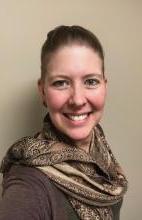Kate Klonowski recently joined the Office of Government and Community Relations as the director of local government and community relations. A former K-12 educator, Klonowski is passionate about lifelong learning and engaging with diverse communities. Read more about Klonowski.
Tell us about your responsibilities in this new role as director of local government and community relations.
I serve as a liaison between the university and our community partners, as well as between our local government representatives and allies. Essentially, I’m an ambassador for the university..
Part of the work you’re doing also involves rolling out Collaboratory. Tell us about Collaboratory and why it’s such a valuable tool.
Collaboratory is an online tool and searchable database that everyone in the university and in the community will be able to use to see how we're working together across various aspects of our community work. It’s in addition to the faculty information system that helps document what's going on with research and courses. Collaboratory gives us the ability to see what partners we have in the community and then work more effectively to foster those partnerships and to collaborate. For the community, it's beneficial because they can search various organizations and ways that their organization might be able to work with us. It’s a nice way to build bridges that don’t yet exist. We hope to officially launch it this spring.
You’re working toward your PhD in cultural foundations of education. How does that differ from studying education?
Foundations of education asks questions like, ‘why do we teach math?’ rather than exploring how we should teach math. It asks bigger ‘why’ questions that consider the situations that either allow for something to happen or don’t allow for something to happen in an educational environment. So it’s not just schooling—it's every type of learning that we do. We also take a really close look at critical theories like race theory and gender theory. So it's a really broad field.
What is your dissertation research focused on?
For my dissertation, I am deconstructing a white savior mindset of an educator who is working predominantly with students of color in order to create student media. In an autoethnographic way, it explores how that thought process needs to be examined in order to look at things that we might think are good, but may not be good for everyone. It's setting up a critical framework as a way to be reflective and reflexive about the roles that we play as people in positions of power.
Do you see your dissertation overlapping with the work you’ll be doing here?
I think it will be useful for the work that we're doing on outreach to really think about why we're doing this outreach—is it just to check a box or is it to really consider what kind of institutional change could be achieved as a result of this effort? So if the answer is just we're checking off boxes, that doesn't seem very meaningful. It's exciting to be able to bring my studies into a job like this where it could grow and thrive and actually be put into action, as opposed to just theory.
You’re a busy person outside of work—you’re a wife and mother, you’re an alto in the Cleveland Orchestra Chorus and you’re a board member at The Land. When do you sleep?
I think all of these things really inform each other, which is wonderful. One of the things that I found in doctoral research is that there's no limit to your education. Everything is a learning experience. So all of the activities I do and the roles I have really inform the work that I'm doing for the university now—and that’s really about being more of a listener, rather than saying, “I know how I can fix this.” I believe that once we feel like we've figured something out or we've accomplished something great, then we should never, ever think that we can rest and just coast. That's not how institutions change. That's not how we grow and continue to learn. And if we're an institution of learning, then what better way to do that than to constantly call ourselves into question and learn new things?


